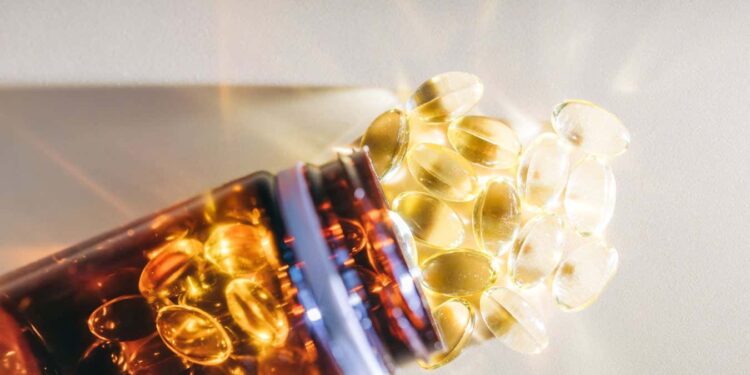
Vitamin D supplements are recommended during the darker months in many countries
Olga Pankova/Getty Images
Taking one type of vitamin D supplement seems to cut the levels of another type that is more easily used by the body, which could affect our immune system.
Our bodies create vitamin D when ultraviolet rays in sunlight convert a protein called 7-dehydrocholesterol in the skin into a type of vitamin D known as vitamin D3. When sunlight is sparse during autumn and winter, countries like the UK recommend people take supplements.
Two forms of these supplements are available: vitamin D3, or cholecalciferol – which normally comes from lanolin, a waxy substance on sheep’s wool – and vitamin D2, or ergocalciferol, which mainly comes from mushrooms. It was thought that it didn’t really matter which one you took.
But now, Emily Brown at the University of Surrey, UK, and her colleagues have performed a meta-analysis of 11 previously published randomised-controlled trials on vitamin D supplements, with a total of 655 participants.
They found taking vitamin D2 supplements can lead to a drop in the body’s concentration of vitamin D3. Why this happens, or if vitamin D3 supplements reduce vitamin D2 levels, isn’t entirely clear.
Furthermore, in many of the studies, the vitamin D3 levels were lower in people taking vitamin D2 than they were in control groups not taking any vitamin D supplements. “This is a previously unknown effect,” says Brown.
A 2022 study suggests vitamin D2 and D3 have overlapping but different roles in supporting immune function. Only vitamin D3 seems to stimulate the type-I interferon signalling system, for instance, which provides a first line of defence against bacteria and viruses.
Brown says the findings suggest vitamin D3 supplements may be more beneficial for most individuals than vitamin D2, but adds personal considerations need to be taken into account, such as wanting to avoid animal products.
They also don’t mean people should just stop taking vitamin D2, she says. “Your total vitamin D level will still be sufficient if you are taking vitamin D2 supplements, but you might find that it’s less effective and you might lose out on those additional functions in terms of immune support.”
Ouliana Ziouzenkova at The Ohio State University points out studies have shown that among older people, the conversion of vitamin D3 to its active form called calcitriol can be less efficient, so D2 supplementation may be particularly beneficial in this population.
“In the absence of any evidence for negative effects, if someone who is vegan is deficient in vitamin D, opting for a D2 supplement over no supplement remains the likely prudent choice,” says Bernadette Moore at the University of Liverpool in the UK.
Plant-based vitamin D3 has started to become more accessible. For instance, a tomato has been gene-edited to produce vitamin D3, but trials are ongoing.
Team member Susan Lanham-New, also at the University of Surrey, hopes the research will remind people of the importance of vitamin D supplements. “There are many people in the United Kingdom and other areas of northern latitude who in winter get mild osteomalacia [known as rickets in children], caused by lack of vitamin D – which presents itself in lethargy, bone pain, muscle, ache susceptibility to infection tiredness – and don’t realise,” she says.
Source link : https://www.newscientist.com/article/2496879-vitamin-d-supplements-may-lower-your-level-of-one-type-of-vitamin-d/?utm_campaign=RSS%7CNSNS&utm_source=NSNS&utm_medium=RSS&utm_content=home
Author :
Publish date : 2025-09-18 01:01:00
Copyright for syndicated content belongs to the linked Source.







